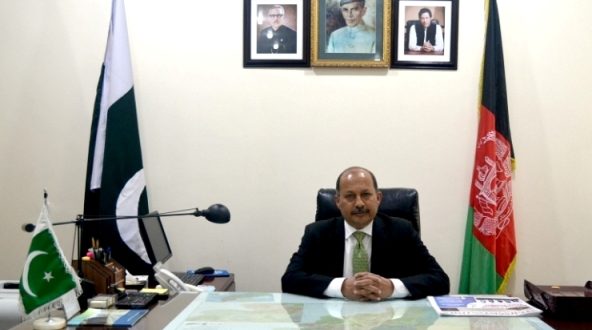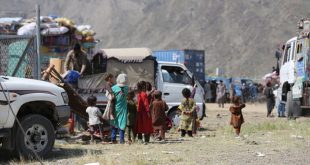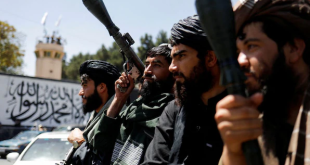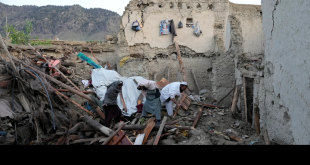Kabul, and Islamabad need to focus on shared infrastructures, such as building roads like the Peshawar-Kabul and Quetta-Kandahar motorways, and railways, like connections between South Asia and Central Asia which would go through Afghanistan and Pakistan benefiting the whole region, and making Afghanistan a key connectivity hub.
By Farhad Naibkhel
KABUL: Relations between Afghanistan and Pakistan have never been easy, despite the fact that the two countries share a common religion, culture and in some areas, speak the same language – and of course, a 2,640 km crossing line, the Durand Line.
As mistrust prevailed, a cyclical blame game has characterized relations between both nations for decades.
But Pakistan’s top diplomat in Kabul is a strong advocate of addressing disagreements as a way to strengthen bilateral ties based on mutual interests. “We want a peaceful, stable, independent, unified, democratic and sovereign Afghanistan,” Mansoor Ahmad Khan, Pakistan Ambassador to Afghanistan, told Afghanistan Times in an exclusive interview.
A conversation, in which Mr. Ahmad Khan reiterated his country’s wholehearted commitment to an Afghan-led, Afghan-owned peace process that finally brings lasting peace into the country.
Amid the ongoing second phase of the intra-Afghan peace talks between Afghan and Taliban negotiators, Mr. Ahmad Khan told Afghanistan Times that Pakistan believes enduring peace and stability in Afghanistan can only be achieved through an inclusive and broad-based peaceful settlement because “there is no military solution to the conflict.”
He pointed out that Pakistan is playing a constructive role in the peace process, and that it is encouraging to see consensus among the international community, within the region as well as in Afghanistan on the need to work towards a peaceful settlement of the Afghan conflict.
The international community, the European Union and the neighboring counties should play a facilitating and supporting role to bring about stability in the country. But at the end, “the peace settlement and political system that emerged from the current peace process should be decided by Afghans themselves,” insisted Mr. Ahmad Khan.
Speaking about U.S. Special Peace Envoy for Afghanistan Peace, Zalmay Khalilzad’s frequent visits to Pakistan, ambassador Ahmad Khan noted that Mr. Khalilzad has been deeply engaged in the peace talks, making regular visits to Doha, Pakistan, Afghanistan and other important countries in an effort to support the process.
“This is indeed a historic opportunity. There is a determined commitment among Afghan leaders; there is the backing from neighbors; and there is support from key international actors for peace and stability in Afghanistan.”
The Pakistani diplomat told Afghanistan Times that terrorism remains a serious threat to both countries, as well as to the region. Therefore, “it is crucial that Pakistan and Afghanistan strengthen cooperation and coordination in the field of counter terrorism.”
Our “prime minister, who came here, clearly said that after Afghanistan itself, Pakistan will be the biggest beneficiary of peace in Afghanistan,” said the ambassador referring to Pakistan’s Prime Minister, Imran Khan’s, recent visit to Kabul.
According to him, all actors should remain committed to the peace talks in order to reach an inclusive and peaceful settlement in Afghanistan. “And all sides should continue efforts to reduce violence and agree on a ceasefire in order to bring an end to the conflict – a process in which Pakistan play a constructive role.”
“Kabul and Islamabad should organize regular institutional engagements. With this in mind, we have established forums like the Afghanistan-Pakistan Action Plan for Peace and Solidarity (APAPPS) as we work together to ensure that our soils are not used against each other.”
Pakistan considers Afghanistan as a sovereign country, said the ambassador, adding that Pakistan will support in every possible way the implementation of these peace efforts and will continue to engage with Kabul to strengthen cooperation in several fields.
The ambassador added that deepening economic cooperation will help bolster mutual security. “Peace and stability will make economic and trade interactions thrive, enhancing connectivity between our two countries and the region as a whole,” stressed Mr. Ahmad Khan.
The ambassador pointed out that although the potential of bilateral trade is US$5-7 billion, the present volume of trade is just around US$1 billion, so there is plenty of scope to expand this mutually-beneficial area.
The two countries need to focus on shared infrastructures, such as building roads like the Peshawar-Kabul and Quetta-Kandahar motorways, and railways, like connections between South Asia and Central Asia which would go through Pakistan and Afghanistan benefiting the whole region, and making Afghanistan a key connectivity hub, the ambassador concluded.
 Afghanistan Times
Afghanistan Times




